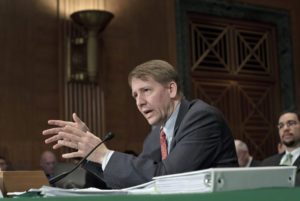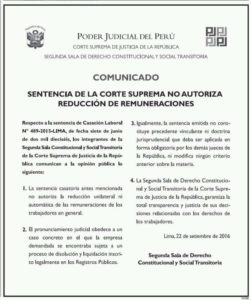SIX STAR HOLDINGS, LLC v. CITY OF MILWAUKEE
Milwaukee ordinances required certain licenses before a business was permitted to offer nude or partially nude entertainment. Six Star, which applied for a license, and Ferol, which did not apply challenged these ordinances, seeking injunctive relief and damages. Once the ordinances were repealed, they dropped their requests for injunctive relief but continued to pursue damages. The district court held that the ordinances addressed time, place, and manner of expression, but did not include the necessary procedural safeguards. A jury then decided that but for the unconstitutional ordinances, Ferol would have opened a club providing nude entertainment. It awarded Ferol compensatory damages in the form of lost profits, and gave Six Star nominal damages. The Seventh Circuit affirmed, rejecting the city’s argumens that Ferol had no injury and therefore no standing to challenge the ordinances, and its challenge to Ferol’s theory of causation and the award of nominal damages to Six Star. View “Six Star Holdings, LLC v. City of Milwaukee” on Justia Law.
In: justia.com
DECISION AND ORDER
LYNN ADELMAN, District Judge.
Since 2009, plaintiffs Six Star Holdings, LLC and Ferol, LLC have sought to open night clubs featuring erotic dance entertainment in the downtown area of the City of Milwaukee. In order to both serve liquor and present erotic dancing,
[932 F.Supp.2d 944]
the plaintiffs had to obtain two licenses under the Milwaukee Code of Ordinances: a tavern license and a “tavern amusement” license. In August 2010, each plaintiff applied for both licenses, and the City denied their applications. A year later, in September 2011, plaintiff Six Star decided to open a night club that featured erotic dance entertainment but did not serve alcohol. Six Star thought that to open such a “dry” gentlemen’s club, it needed to be licensed to operate a theater. It therefore applied for a theater license. However, the City never acted on that application. Instead, a few months after Six Star applied for a theater license, the City repealed the chapter of the Code of Ordinances that provided for issuance of theater licenses. At the same time, the City also repealed the ordinance governing tavern-amusement licenses as well as a related ordinance governing “public entertainment clubs.” The City replaced these ordinances with new ordinances governing “public entertainment premises.”
In the present lawsuit, which arises under 42 U.S.C. § 1983, the plaintiffs allege that the former ordinances governing tavern amusement, theaters, and public entertainment clubs violated the First Amendment. They also allege that the tavern, tavern-amusement, and theater ordinances were unconstitutionally applied to them. The plaintiffs do not seek any injunctive or other form of prospective relief, and they do not bring any claims involving the newly enacted ordinance governing public entertainment premises. Instead, they seek only damages for the time period in which the repealed ordinances (and the tavern ordinance, which is still in force) prevented them from offering erotic dance entertainment in the City. Before me now are the parties’ motions for summary judgment.
I. BACKGROUND
The plaintiffs are managed by John Ferraro, who is the manager of three existing erotic dance establishments in Wisconsin, each named Silk Exotic Gentlemen’s Club. One of these establishments is located in the City of Milwaukee, although not in the downtown area. In 2009, Ferraro formed Ferol and leased premises located on Pittsburgh Avenue in downtown Milwaukee, intending to open a new erotic dance establishment, named Satin. Because Satin would have offered both liquor and erotic entertainment, Ferol needed to obtain both a tavern license and a tavern-amusement license. Ferol applied for both licenses in July 2009. Once the applications were filed, the alderman for the district in which Satin was to be located informed his constituents of Ferol’s proposal. Many in the neighborhood voiced opposition to the proposal, and Ferol’s lawyer advised it that, based on the amount of public opposition, the applications were sure to be denied. Under the Code of Ordinances, when a license application is denied, the applicant is disqualified from applying for the same license for the same premises for one year. See Milwaukee Code of Ordinances § 85-13-4-a. After considering the advice of its lawyer, Ferol decided to withdraw its applications rather than risk having the applications denied and being prohibited from reapplying for one year.
In August 2010, Ferraro decided to reapply for tavern and tavern-amusement licenses for Satin. He also decided to attempt to open a third erotic dance establishment in the City of Milwaukee and formed Six Star for the purpose of operating that establishment, which would have been named Silk East. Six Star proceeded to execute a lease for a location on Old World Third Street in downtown Milwaukee and to apply for the necessary tavern and tavern-amusement licenses.
[932 F.Supp.2d 945]
Soon after Ferol and Six Star filed their applications, community members expressed opposition to the proposals. However, rather than withdraw their applications, both Ferol and Six Star decided to proceed to a hearing before the Licenses Committee of the Milwaukee Common Council, which was held on September 20, 2010. During the hearing, the Committee heard testimony from members of the communities surrounding each proposed establishment. The plaintiffs had lawyers present and were permitted to cross-examine the community members who testified in opposition to the applications. The plaintiffs were also permitted to present their own witnesses in support of their applications.
The Committee heard Six Star’s applications first. Sixteen witnesses testified in opposition to its proposal for the Old World Third location. Ten of those witnesses represented commercial interests in the neighborhood, such as existing retail stores, hotels, and business associations. They almost uniformly opposed using the location as an erotic dance establishment on the ground that such a use would have been inconsistent with a development plan that had been adopted for the neighborhood. The business representatives testified that the goal of the development plan was to attract more retail establishments to the neighborhood, such as clothing stores and other shops, and that the presence of a gentlemen’s club would deter retailers from moving in. Most of the remaining witnesses were residents of the neighborhood, including individuals who lived in apartments above the proposed location. Those witnesses expressed concern about the noise that the proposed establishment would generate, about the safety of the neighborhood given the kind of clientele adult establishments are known to attract, and about the effect of the establishment on property values. Some of the residents also noted that the area was already oversaturated with bars and night clubs. One resident, Francisco Camacho, indicated that he found erotic dancing offensive. He testified that he opposed both Six Star’s and Ferol’s proposals on the ground that erotic dancing perverts the community and is against the teachings of Islam.
Alderman Bauman, the alderman for the district, testified in opposition to Six Star’s applications. He mostly emphasized the concerns of the business community and their efforts to turn the area into one focused on shopping and retail. As he explained:
There is an inherent conflict between trying to generate retail and commercial with a gentlemen’s club. Forget the morality issue, forget the propriety of it all, just look at the economics of it. They are somewhat different markets. They are looking for different things by their very definition. And you’re not going to put an American Girl’s store next to a gentlemen’s club on Chicago Avenue and Michigan Avenue, for example. They are conflicting markets. You’ve heard from the downtown. The City of Milwaukee has invested, I believe it’s $50,000 with a match from the downtown stakeholders of another $50,000 for a $100,000 fund to attempt to catalyze downtown retail investment. Again, we’re working at cross purposes. If we allow clubs that will retard that retail development, our investments are making no sense.
Continuation of Licenses Committee Hearing Tr., Sept. 20, 2010 at 12-13, ECF No. 61-2.
Once all testimony had been taken, the Committee discussed Six Star’s applications. Alderman Hamilton moved to recommend that the Common Council deny the applications on the ground that granting the licenses would be contrary to the
[932 F.Supp.2d 946]
health, safety and welfare of the neighborhood. He explained that his motion was based on the inconsistency between an erotic dance establishment and the kind of retail environment that the neighborhood was trying to create, and also on the residents’ “resounding opposition” to the proposal. See id. at 19-20. The Committee voted to recommend that the Common Council deny Six Star’s applications. The vote was unanimous.
Turning to Ferol’s applications, the Committee heard testimony from eleven witnesses who opposed the proposal. The witnesses included representatives of the business community and residents of the neighborhood. Both the residents and the business representatives stated that the proposal was inconsistent with a development plan that had been adopted for the area. As one witness explained, the development plan called for a mix of residential and retail uses, including so-called “mixed” uses in which retail or commercial establishments occupied the first floor of a building and residential units occupied the upper floors. See Continuation of Licenses Committee Hearing Tr., Sept. 20, 2010 at 22-25, ECF No. 62-1. The plan specified that the commercial uses in the neighborhood would be “boutique-scaled,” which meant that they would be small-scale businesses such as boutique retailers and design showrooms. Id. at 22-23. The witness explained that the proposal for Satin involved a large facility (20,000 square feet and up to 1,000 to 1,200 patrons per day) that was significantly out-of-scale with this focus on boutique uses. The witness further explained that there was not enough parking in the area to support a facility of that size. Other witnesses echoed this concern about adequate parking. Still other witnesses expressed concern about the effect of the proposal on residential property values and on neighborhood safety, and about potential noise and traffic issues.
Alderman Witkowiak, the alderman for the district, also testified in opposition to Ferol’s applications. He mostly reiterated the concerns expressed by the community members who testified in opposition to Ferol’s applications. He explained that the proposal was too large and out-of-scale for the neighborhood, that there would be inadequate parking space to support the proposal, that the proposal was inconsistent with the development plan for the area, and that some residents were concerned about safety and property values.
Once all testimony had been taken, the Committee discussed Ferol’s applications. This time, Alderman Kovacs moved to recommend that the Common Council deny them. He cited the overwhelming objections by the residents and businesses in the neighborhood and potential parking and traffic problems. The Committee unanimously voted to recommend that the Common Council deny Ferol’s applications.
The next day, September 21, 2010, the Common Council voted to accept the Licensing Committee’s recommendations on Six Star’s and Ferol’s applications for tavern and tavern-amusement licenses.
Approximately one year later, Six Star decided that it would attempt to operate the Old World Third location as a “dry” gentlemen’s club — i.e., a night club that featured erotic dance entertainment but that did not serve alcohol. Six Star thought that it needed a theater license under Chapter 83 of the Code of Ordinances to operate such an establishment, and on September 14, 2011, it applied for such a license. Pursuant to its usual practice, the City Clerk’s office notified the alderman for the district that the application had been filed. That was Alderman Bauman, and he instructed the City Clerk to “hold” Six Star’s application. Because of this hold, Six Star’s application was not set for a hearing before the Licenses Committee, and no action was ever taken on
[932 F.Supp.2d 947]
the application before the City repealed Chapter 83.
II. DISCUSSION
A. Claims Involving Tavern and Tavern-Amusement Licenses
The plaintiffs’ primary claims are that the tavern-amusement ordinance, which, before March 1, 2012, appeared in Chapter 90 of the Milwaukee Code of Ordinances,1was unconstitutional on its face and unconstitutionally applied to them. However, the tavern-amusement ordinance did not, by itself, prevent either plaintiff from operating taverns that featured erotic dance entertainment. Rather, the plaintiffs needed both tavern licenses and tavern-amusement licenses to open the kind of nightclubs they planned to open.2 The City considered the plaintiffs’ applications for both of these kinds of licenses together at the same hearing and denied them both for the same reasons. See Licenses Committee Hearing Tr., Sept. 20, 2010, at 2, ECF No. 59-1; Continuation of Licenses Committee Hearing Tr., Sept. 20, 2010, at 3, ECF No. 62-1. The plaintiffs have not argued that the tavern-licensing ordinance was unconstitutional on its face and have not clearly developed any argument showing that it was unconstitutionally applied to them. Yet, unless plaintiffs could show that the tavern-licensing ordinance was either unconstitutional on its face or unconstitutionally applied to them, they would not be entitled to damages even if the tavern-amusement ordinance were invalidated. Nonetheless, the arguments that plaintiffs make against the tavern-amusement ordinance to a certain extent imply that the City applied the tavern-licensing ordinance unconstitutionally, and the City does not argue that it is entitled to summary judgment on the ground that the plaintiffs have not brought a proper challenge to the tavern-licensing ordinance. Thus, I consider plaintiffs to be challenging the tavern-amusement ordinance both on its face and as-applied, and the tavern-licensing ordinance as-applied.
Turning to these challenges, the plaintiffs’ first argument is that the City imposed a “prior restraint” on speech without complying with the strict procedural requirements governing prior restraints. See, e.g., FW/PBS, Inc. v. City of Dallas, 493 U.S. 215, 110 S.Ct. 596, 107 L.Ed.2d 603 (1990); City of Lakewood v. Plain Dealer Publ’g Co., 486 U.S. 750, 108 S.Ct. 2138, 100 L.Ed.2d 771 (1988); Freedman v. Maryland, 380 U.S. 51, 85 S.Ct. 734, 13 L.Ed.2d 649 (1965). However, the Seventh Circuit rejected that very argument in Blue Canary Corp. v. City of Milwaukee, 251 F.3d 1121 (7th Cir.2001). There, the Seventh Circuit considered a challenge to a City of Milwaukee tavern-licensing decision that was in all material respects the same as the challenge the plaintiffs bring in the present case — a challenge involving the City’s denial of a tavern license and an appropriate tavern-amusement license for a tavern that wanted to present erotic entertainment.3 The court framed
[932 F.Supp.2d 948]
the question presented as whether the City was permitted to take into account, in deciding whether to grant the licenses, “the character of the entertainment that the plaintiff served with its drinks.” Id. at 1123. The plaintiff had argued that, in answering that question, the court should treat the City’s licensing requirements as prior restraints. However, the court rejected that argument and evaluated the City’s requirements under the standards applicable to time, place, or manner restrictions. Id. Accordingly, in the present case, I must treat the City’s licensing requirements as time, place, or manner restrictions rather than as prior restraints.4 See also Schultz v. City of Cumberland, 228 F.3d 831, 851 (7th Cir.2000) (“Licensing, though functioning as a prior restraint, is constitutionally legitimate when it complies with the standard for time, place or manner requirements.”).
Blue Canary also establishes that a city’s decision to deny tavern licenses on the basis of the “character” of the applicant’s proposed entertainment is, in general, a permissible regulation of the time, place, or manner of expressive activity. As the court explained, a city is permitted to consider the secondary effects of the entertainment, such as noise, safety, parking and traffic problems, and the general incompatibility of the entertainment with the normal activity of the neighborhood, when making licensing decisions. See 251 F.3d at 1123-25. In the present case, the transcript of the licensing hearing indicates that the City denied the plaintiffs’ license applications for reasons having to do with these secondary effects rather than with disapproval of the content of the proposed expressive activity. The primary reason for denying the licenses for Silk East was that its presence in the neighborhood would have deterred the kind of retailers the community was trying to attract. As the alderman for the district testified, a retailer like American Girl® is unlikely to open a shop next to a gentlemen’s club. This was a permissible basis for denying the licenses. See id. at 1124 (“Countless cases allow municipalities to zone strip joints, adult book stores, and like erotic sites out of residential and the classier commercial areas of the city or town. Establishments that purvey erotica, live or pictorial, tend to be tawdry, to be offensive to many people, and to attract a dubious, sometimes a disorderly, clientele. Liquor and sex are an explosive combination, so strip joints that sell liquor are particularly unwelcome in respectable neighborhoods.”). Likewise, the decisions to deny the licenses for Satin were based on its incompatibility with the neighborhood — the community members testified that the proposal was out-of-scale and that it would present parking, traffic, and safety issues. Again, a decision based on such secondary effects rather than on disagreement with the content of the expressive message qualifies as a permissible time, place, or manner regulation.5
[932 F.Supp.2d 949]
The plaintiffs argue that the City’s decisions cannot be upheld under a secondary-effects rationale because the City did not produce formal studies or other credible evidence supporting its conclusion that erotic entertainment generates secondary effects. See Reply Br. at 5-8, ECF No. 75. However, the cases on which plaintiffs rely for the proposition that a city must produce evidence concerning secondary effects involved ordinances that, by their terms, expressly regulated erotic entertainment. See City of Los Angeles v. Alameda Books, 535 U.S. 425, 122 S.Ct. 1728, 152 L.Ed.2d 670 (2002), Annex Books, Inc. v. City of Indianapolis, 581 F.3d 460 (7th Cir.2009), R.V.S., L.L.C. v. City of Rockford, 361 F.3d 402, 411 (7th Cir.2004). In the present case, neither the tavern-licensing ordinance nor the tavern-amusement ordinance purported to regulate erotic activity specifically. Rather, those ordinances were designed to deal with the direct effects of taverns and the secondary effects of all forms of tavern entertainment. See Milwaukee Code of Ordinances § 90-35-1 (stating that City had found that tavern entertainment “can be a source of noise, litter, large and unruly congregations of people, and traffic and parking congestion that adversely affects the health, safety and welfare of the people of the city of Milwaukee”). No authority of which I am aware holds that a city must rely on formal studies before it may conclude that tavern entertainment has the potential to produce secondary effects such as noise, parking, and traffic problems, or the potential to conflict with the normal activity of a neighborhood. That conclusion would seem to be obvious, just as it is obvious that rallies held in a public park have the potential to generate excessive noise and other secondary effects. See Thomas v. Chicago Park District, 227 F.3d 921, 924 (7th Cir.2000). Moreover, at the licensing hearing, the City did take evidence, in the form of testimony from those in the neighborhood, before concluding that the plaintiffs’ proposals would in fact generate undesirable secondary effects. Blue Canary establishes that neighborhood testimony is appropriate evidence concerning the secondary effects of a proposed form of tavern entertainment. 251 F.3d at 1124-25. Thus, before the City denied the plaintiffs’ license applications, it did consider appropriate evidence concerning secondary effects, and so the City’s decisions were not inconsistent with Alameda Books and related cases.
The plaintiffs also argue that the City cannot satisfy the prong of the time, place, or manner test requiring the government to leave open reasonable alternative avenues of communication. See City of Renton v. Playtime Theatres, Inc., 475 U.S. 41, 47, 106 S.Ct. 925, 89 L.Ed.2d 29 (1986).6 Although the plaintiffs initially argue that the City cannot show that it left open reasonable alternative avenues for all forms of tavern entertainment — including musical performances, stand-up comedy, dancing, karaoke, and other forms of tavern entertainment — their focus is on the lack of alternative avenues for erotic entertainment.7 Plaintiffs argue that, to carry its burden as to reasonable alternatives, the City must point to parcels of property
[932 F.Supp.2d 950]
where erotic entertainment was permitted as a matter of right rather than at the discretion of the City’s licensing authorities. However, neither the Supreme Court nor the Seventh Circuit has held that a time, place, or manner restriction leaves open reasonable alternative avenues of communication only if it permits certain forms of expression as a matter of right in designated areas. Thus, the City’s burden is not to point to sites where erotic dancing was permitted without a license. Rather, to satisfy the reasonable-alternatives requirement, the City must show that it did not exercise its licensing authority in a way that resulted in an unreasonable restriction on erotic expression.
To that end, the City has offered evidence as to the number of taverns allowed to present erotic dance entertainment in the City of Milwaukee between 2006 and 2010. There were fifteen taverns that presented erotic entertainment on a regular basis in 2006, fourteen in 2007, ten in 2008, twelve in 2009, and eleven in 2010. Each year, a few other taverns offered erotic entertainment on a part-time or occasional basis. (In 2010, for example, five taverns offered occasional erotic entertainment.) The plaintiffs contend that these numbers are insufficient for a city with a population close to 600,000. However, no evidence in the record indicates that any person who wanted to view erotic dance entertainment in the City of Milwaukee between 2006 and 2010 found it unreasonably difficult to do so.
The plaintiffs contend that even if the number of erotic dance establishments in Milwaukee was sufficient to meet the needs of consumers of such entertainment, a time, place, or manner restriction must also allow those who wish to present such entertainment a reasonable opportunity to present it. That general proposition is true. See North Avenue Novelties, Inc. v. City of Chicago, 88 F.3d 441, 444 (7th Cir.1996) (noting that, when examining availability of reasonable alternatives, “it is necessary to focus both on the ability of producers as a group to provide sexually explicit expression, as well as on the ability of the public as a whole to receive it”). However, the evidence in the record does not show that the licensing requirements left purveyors of erotic entertainment with no reasonable opportunities to operate in the City. True, the licensing ordinance prevented the plaintiffs from opening erotic dance establishments at their chosen locations, but the plaintiffs have not shown that they could not have found alternative locations in the City. Of course, because of the licensing requirements, the plaintiffs could not have known for sure whether they would have been permitted to offer erotic dance entertainment at any specific alternative location unless they actually applied for a license for that location and received a decision on the application, but the plaintiffs have offered no evidence suggesting that they even considered alternative sites, such as sites that were not located in the downtown area.8 Moreover, the plaintiffs have offered no evidence from other would-be purveyors of erotic entertainment indicating that the City’s licensing requirements prevented them from offering
[932 F.Supp.2d 951]
erotic entertainment within the city limits. To be sure, the plaintiffs point out that a fair number of applications for new erotic taverns were either denied or withdrawn between 2006 and 2010, but no context is given for those denials and withdrawals (other than those involving the plaintiffs’ applications). For example, I have not been told where the proposed taverns would have been located, whether the proposed licensees made reasonable efforts to find alternative locations, or whether the proposed licensees were qualified to hold tavern licenses in the first place. Thus, based on the present record, which includes the fact that a number of taverns featuring erotic dance entertainment operated within the city limits during the time period relevant to this suit — including one operated by the manager of the plaintiffs — I conclude that the City left open reasonable alternative avenues for presenting and consuming erotic dance entertainment.
The plaintiffs also contend that the tavern and tavern-amusement ordinances granted City officials “unbridled discretion” to determine whether to grant or deny such licenses. “Unbridled discretion” is a phrase that derives from prior-restraint cases involving censorship, see Southworth v. Bd. of Regents, 307 F.3d 566, 575-78 (7th Cir.2002) (discussing history of unbridled discretion), but it has been applied in cases in which the prior restraint is analyzed as a time, place, or manner restriction, see Thomas v. Chicago Park Dist., 534 U.S. 316, 323, 122 S.Ct. 775, 151 L.Ed.2d 783 (2002). However, in either kind of case, the concern behind the unbridled-discretion standard is censorship — a risk that the licensing authority will use its unduly broad discretion to favor or disfavor speech based on content. Id. The standard is usually applied in circumstances where the law at issue either explicitly involves censorship, such as the law governing the Maryland board of censors at issue in Freedman v. Maryland, 380 U.S. 51, 85 S.Ct. 734, 13 L.Ed.2d 649 (1965), or when the law at issue presents a significant censorship risk, such as when a single person is granted power over a newspaper’s ability to sell papers, see City of Lakewood v. Plain Dealer Pub’g Co., 486 U.S. 750, 108 S.Ct. 2138, 100 L.Ed.2d 771 (1988), or a single person is granted power to decide whether a group will be allowed to hold a rally in a public park, see Thomas, 534 U.S. at 323-24, 122 S.Ct. 775.
In the present case, the tavern and tavern-amusement licensing requirements did not explicitly involve censorship, and they did not present a significant censorship risk. As discussed, the purpose of the licensing requirements was not censorship but to ensure that a proposed form of tavern entertainment was basically compatible with the neighborhood in which it planned to locate. Moreover, it is difficult to envision a realistic scenario in which the Licenses Committee could have used its licensing power to favor or disfavor specific forms of expressive tavern entertainment. As the Seventh Circuit recognized in Blue Canary, the City of Milwaukee is a major city rather than a small town with a homogenous population that is likely to find certain forms of tavern expression offensive and to want to ban them from the City. 251 F.3d at 1124. Thus, there was never any realistic chance that the Licenses Committee would have used its licensing authority to facilitate a campaign to ban rock music, erotic dancing, or any other form of entertainment from the City’s taverns. It is also important to take note of the procedural elements of the licensing ordinances, which required the Licenses Committee to hold a public hearing and make its recommendation to the Common Council in writing. SeeMilwaukee Code of Ordinances § 90-35-4-c; Stip. Facts ¶¶ 25-40, ECF No. 44. If the City’s residents had found a particular form of tavern entertainment offensive and opposed
[932 F.Supp.2d 952]
a license application for that reason, and the Licenses Committee had recommended denial of the application for the same reason, those events would have been out in the open and could have been remedied through an as-applied challenge. This is in contrast to unbridled-discretion cases like City of Lakewood, in which the decisionmaker could have rendered an as-applied challenge ineffective by denying a license without holding a hearing or identifying the evidence on which he or she relied. 486 U.S. at 769, 108 S.Ct. 2138. Thus, in the present case, the tavern and tavern-amusement ordinances were not invalid on the ground that they vested decisionmakers with unbridled discretion.
The plaintiffs also argue that the tavern and tavern-amusement ordinances do not satisfy United States v. O’Brien, 391 U.S. 367, 88 S.Ct. 1673, 20 L.Ed.2d 672 (1968). In that case, the Supreme Court held that a content-neutral regulation that has an incidental effect on expression satisfies the First Amendment if it meets a four-pronged test: “[1] if it is within the constitutional power of the Government; [2] if it furthers an important or substantial governmental interest; [3] if the governmental interest is unrelated to the suppression of free expression; and [4] if the incidental restriction on alleged First Amendment freedoms is no greater than is essential to the furtherance of that interest.” Id. at 377, 88 S.Ct. 1673. Plaintiffs argue that the tavern and tavern-amusement ordinances did not satisfy the first prong of the O’Brien test — that the ordinances be “within the constitutional power of the Government” — and they give two reasons in support of this argument: (1) the ordinances were contrary to Chapter 125 of the Wisconsin Statutes, which relates to alcoholic beverages, and (2) the ordinances were de facto zoning regulations that were not passed pursuant to the state-law procedures that apply to zoning regulations. In making these arguments, the plaintiffs assume that O’Brien’s first prong allows a court to examine whether a municipality complied with state law when passing the regulation at issue. However, I can find no authority that supports this assumption. O’Brien’s first prong is rarely discussed, but there is no indication that it was meant to “constitutionalize” matters of state law.9 Rather, when courts apply O’Brien’s first prong to a municipal regulation, they ask only whether the regulation at issue is of a kind that is within the “general police powers” of a municipality. See Ben’s Bar, Inc. v. Vill. of Somerset, 316 F.3d 702, 722-23 (7th Cir.2003). In the present case, there is no question that regulating the locations of taverns and the time, place and manner of tavern entertainment is within the general police powers of a municipality. Id. at 722 (holding that a municipality’s “regulation of alcohol sales and consumption in `inappropriate locations’ is clearly within its general police powers”); Blue Canary, 251 F.3d at 1124. To the extent plaintiffs believe that the City failed to comply with state law when passing the specific ordinances at issue, they may have a claim against the City under state law. However, in the present case, the plaintiffs have brought
[932 F.Supp.2d 953]
no state-law claims and proceed only under 42 U.S.C. § 1983. See Fourth Amended and Supplemental Complaint ¶ 101, ECF No. 36. Thus, these matters of state law are not subject to review in this case.
Finally, Six Star argues that the City’s decision to deny its license applications was “discriminatory” because the City ultimately granted tavern and tavern-amusement licenses for the Old World Third premises to another applicant, Robert Smith. Six Star contends that the only difference between its proposal and Smith’s proposal was that Smith did not propose to offer erotic entertainment. That appears to be true, but as discussed, the City was allowed to base its decision on “the character of the entertainment” that Six Star intended to present and whether such entertainment was compatible with the normal activity of the neighborhood. Blue Canary, 251 F.3d at 1123. Here, the decision to permit Smith’s tavern but exclude Six Star’s gentlemen’s club is explainable by the fact that the presence of an ordinary tavern in the neighborhood would not have deterred respectable retailers from moving in, whereas the presence of a gentlemen’s club would have. Thus, the City’s having granted tavern and tavern-amusement licenses for the Old World Third premises to a different applicant does not show that the decision to deny Six Star’s applications for the same licenses was based on impermissible factors.
Accordingly, the City’s motion for summary judgment on plaintiffs’ claims involving the tavern and tavern-amusement ordinances will be granted.
B. Theater Ordinance
Former § 83-1-2 of the Milwaukee Code of Ordinances stated that “[n]o person, firm or corporation … shall keep, maintain, conduct or operate for gain or profit, any theater or moving picture house in the city without first obtaining a license therefore.” Section 83-1-1-b defined “theater” as “any edifice, or parts thereof, used for the purposes of dramatic or operatic or other exhibitions, plays or performances for admission to which remuneration or any other consideration is paid, charged or received.” Section 83-1-5-b stated that an application for a theater license “shall be granted when the following requirements are met: the building, structure or premises for which the license is sought must conform in all respects to the provisions of this section and to the law of this state and the ordinances of the city applying to such buildings, structures, or premises.”
In September 2011, Six Star applied for a license to operate the Old World Third location as a theater called the Outer Limits Gentlemen’s Club. The theater would have offered erotic dance entertainment but no alcohol. It is undisputed that, pursuant to a “hold” placed on Six Star’s application by Alderman Bauman, no decision was ever made on Six Star’s application. The theater ordinance was repealed effective March 1, 2012.
The plaintiffs claim that former Chapter 83 was unconstitutional on its face and was unconstitutionally applied to Six Star. I begin with Six Star’s as-applied challenge, which hinges on the fact that the City dragged its heels and never reached any decision on the licensing application before repealing the theater ordinance.10Numerous cases recognize that a licensing or permitting scheme that touches upon expression violates the First
[932 F.Supp.2d 954]
Amendment when it allows the government to unreasonably delay or postpone a decision on whether to grant or deny a license. See, e.g., City of Lakewood, 486 U.S. at 771, 108 S.Ct. 2138; Freedman, 380 U.S. at 57-58, 85 S.Ct. 734; Vodak v. City of Chicago, 639 F.3d 738, 749 (7th Cir.2011); Thomas, 227 F.3d at 927-28. Here, the theater ordinance was a regulation governing the time, place, or manner of expressive activity — namely, “dramatic or operatic or other exhibitions, plays or performances,” § 83-1-1-b. Thus, to defeat Six Star’s as-applied challenge, the City must offer a legitimate explanation for its failure to render a prompt decision on Six Star’s application to engage in such expressive activity at the Old World Third location.
The City’s primary argument is that Six Star applied for the wrong kind of license. It contends that, in September 2011, the license required for offering erotic dance entertainment in an establishment that does not serve alcohol was the public entertainment club license required by Milwaukee Code of Ordinances § 108-5-1-a (2010). However, even if that were true, it would not have justified the City’s failure to render a decision on Six Star’s application. If the City believed that Six Star had applied for the wrong license, it should have denied the application on that ground. Then, if Six Star thought it had applied for the correct license, it could have challenged the City’s decision in an appropriate legal action.
In any event, the facts in the record do not establish that Six Star applied for the wrong type of license. The public entertainment club ordinance required any person who wanted to offer “public entertainment” to obtain an appropriate license or permit. Milwaukee Code of Ordinances § 108-5-1-a (2010). “Public entertainment” was defined as “any entertainment of any nature or description to which the public generally may gain admission, whether with or without the payment of a fee.” Id. § 108-3-3. This definition included plays and other forms of entertainment that fell within the scope of the theater ordinance. However, one did not need both a theater license and a public entertainment club license to offer the kind of entertainment that fell within the scope of the theater ordinance. This was so because the public entertainment club ordinance stated that the holder of a theater license did not need to obtain a public entertainment club license. Id. § 108-5-2-c. Moreover, nothing in either ordinance indicated that an establishment that wanted to offer erotic dance entertainment could not have operated under a theater license instead of a public entertainment club license.11 The repealed ordinances allowed Six Star to choose which type of license it wanted, and it chose to apply for a theater license. Accordingly, the City could not have denied Six Star’s application for a theater license on the ground that Six Star should have applied for a public entertainment club license instead.12
[932 F.Supp.2d 955]
Accordingly, because the City has offered no legitimate explanation for its failure to render a prompt decision on Six Star’s application for a theater license, plaintiffs’ motion for summary judgment on the issue of whether the theater ordinance was unconstitutionally applied to it will be granted. This result eliminates the need to address Six Star’s facial challenge to the repealed ordinance.
There is still the matter of Ferol’s facial challenge to the theater ordinance. Ferol never applied for a license under Chapter 83. However, Ferol contends that because the theater ordinance was a prior restraint, it has standing to challenge the ordinance and to obtain damages. As a general matter, it is true that a plaintiff can bring a facial challenge to an allegedly unconstitutional licensing regulation without applying for a license. See City of Lakewood, 486 U.S. at 755-56, 108 S.Ct. 2138. However, in the present case, the ordinance has been repealed, and Ferol’s Article III standing depends on its having sustained damages as a result of Chapter 83’s existence. Yet, the summary-judgment record contains no affidavit or other evidence indicating that Ferol had concrete plans to open a dry gentlemen’s club (as opposed to a tavern) at the Pittsburgh Avenue location or any other location in the City of Milwaukee during the time that Chapter 83 was in force. Thus, I do not see how Ferol could have been damaged by the mere existence of Chapter 83, and so I am not satisfied that Ferol has standing to challenge Chapter 83 on its face. See Summers v. Earth Island Inst., 555 U.S. 488, 499, 129 S.Ct. 1142, 173 L.Ed.2d 1 (2009) (“it is well established that the court has an independent obligation to assure that standing exists, regardless of whether it is challenged by any of the parties”). Therefore, I will not adjudicate Ferol’s facial challenge to Chapter 83 on the merits at this time. However, should Ferol believe that it can establish Article III standing, it may submit appropriate affidavits to that effect and I will reconsider this ruling.
C. Public Entertainment Club Ordinance
The remaining claims are the plaintiffs’ facial challenges to the former public entertainment club ordinance, which appeared in Chapter 108 of the Milwaukee Code of Ordinances. As already discussed in the context of plaintiffs’ claims involving the theater ordinance, Chapter 108 provided that no person could offer any form of public entertainment without obtaining either a public entertainment club license or a theater license. Having ruled that Six Star is entitled to damages in connection with its as-applied challenge to the theater ordinance, I do not need to separately consider Six Star’s facial challenge to the public entertainment club ordinance, as both claims involve the same pool of damages — namely, damages attributable to Six Star’s inability to offer erotic dance entertainment without also serving alcohol at the Old World Third location. Moreover, because the record contains no affidavits or other evidence indicating that Ferol had any concrete plans to offer erotic dance entertainment without also serving alcohol at the Pittsburgh Avenue location or any other location during the time that the public entertainment club license was in force, I am not satisfied that Ferol has Article III standing to bring a facial challenge to the public entertainment club ordinance. See Summers, 555 U.S. at 499, 129 S.Ct. 1142. Accordingly, I do not need
[932 F.Supp.2d 956]
to reach the merits of plaintiffs’ facial challenges to Chapter 108 at this time. Again, if Ferol believes that it can establish Article III standing, it may submit appropriate affidavits and I will reconsider this ruling.
III. CONCLUSION
For the reasons states, IT IS ORDERED that plaintiffs’ motion for summary judgment is GRANTED IN PART and DENIED IN PART, and that defendant’s motion for summary judgment is GRANTED IN PART and DENIED IN PART. Summary judgment is granted to the City on plaintiffs’ claims involving the tavern and tavern-amusement ordinances. Summary judgment is granted to Six Star on the issue of the City’s liability for damages relating to Six Star’s inability to offer erotic dance entertainment without also serving alcohol at the Old World Third location. I do not reach the merits of Ferol’s claims involving the theater ordinance and the public entertainment club ordinance. If Ferol believes that it can prove that it suffered damages that are traceable to those ordinances, then it may attempt to do so during further proceedings.
IT IS FURTHER ORDERED that the parties’ motions to file briefs that exceed the page limitations [ECF Nos. 48 & 54] are GRANTED.
FINALLY, IT IS ORDERED that an in-person status conference will be held on April 11, 2013 at 10:30 a.m. to discuss further proceedings.
FootNotes
1. Before March 1, 2012, sections 90-33, 90-34, and 90-35 of the Milwaukee Code of Ordinances pertained to tavern-amusement licenses. When I use the term “tavern-amusement ordinance,” I am referring to those former sections of the Ordinances.
2. Various provisions in Chapter 90 of the Code of Ordinances pertain to tavern licensing. Section 90-5 specifies the criteria for obtaining such a license, and when I use terms like “tavern-licensing ordinance” or “tavern ordinance,” I am referring to that section.
3. In Blue Canary, the tavern sought renewal of its existing tavern license rather than a new license. However, for present purposes, there is no material difference between renewal of an existing license and denial of an application for a new license.
4. The plaintiffs contend that Blue Canary was wrongly decided. See Opening Br. at 31 n. 4. However, as plaintiffs acknowledge, I am bound by Seventh Circuit precedent.
5. Although the vast majority of the testimony at the hearing focused on secondary effects, at least one community member’s objection to Silk East and Satin was based, in part, on his moral objection to erotic entertainment. See Licenses Committee Hearing Tr., Sept. 20, 2010 at 5-7, ECF No. 59-1 (testimony of Francisco Camacho). However, objections like Mr. Camacho’s were few and far between, and the record of the hearing does not indicate that the Licenses Committee gave those objections any weight. To be sure, the aldermen said that their decisions were based on the “overwhelming” or “resounding” neighborhood opposition to the proposed establishments, and they did not disclaim statements like Mr. Camacho’s, but given that the vast majority of the opposition was based on secondary effects, I cannot conclude that the content-based objections played a causal role in the City’s decision. I also note that, in Blue Canary, at least some of the public opposition to the renewal of the plaintiff’s liquor license was based on “moral disapproval of the entertainment,” 251 F.3d at 1122, yet the court found no constitutional violation in the City’s decision not to renew the license.
6. Under the usual formulation of the test, time, place, or manner restrictions are constitutional if they are content-neutral, narrowly tailored to serve a substantial governmental interest, and do not unreasonably limit alternative avenues of communication. See, e.g., Ward v. Rock Against Racism, 491 U.S. 781, 791, 109 S.Ct. 2746, 105 L.Ed.2d 661 (1989); City of Renton, 475 U.S. at 46-47, 106 S.Ct. 925.
7. To the extent that plaintiffs actually mean to argue that the City did not leave open reasonable alternative avenues for tavern entertainment in general, it is sufficient to note that there is nothing in the record to suggest that there was a shortage of tavern entertainment in the City of Milwaukee during the period of time for which plaintiffs seek damages.
8. The plaintiffs have not argued that they have a right to offer erotic dance entertainment in the downtown area, as opposed to other areas within the city limits. Moreover, as I have already noted, “[c]ountless cases allow municipalities to zone strip joints, adult book stores, and like erotic sites out of residential and the classier commercial areas of the city or town.” Blue Canary, 251 F.3d at 1124.
9. Plaintiffs cite various cases in which courts reviewed municipal ordinances for compliance with state laws, but in none of those cases did the court purport to be applying the O’Brientest. Instead, it appears that the courts were adjudicating state-law claims. See, e.g., Ravenna Road Mgmt. v. City of Twinsburg, 450 F.Supp.2d 782, 785-86 (N.D.Ohio 2006); Northshor Experience, Inc. v. City of Duluth, 442 F.Supp.2d 713, 718-19 (D.Minn.2006); Fifth Column v. Vill. of Valley View, 100 F.Supp.2d 493, 507 (N.D.Ohio 1998); S. Entm’t Co. of Florida v. City of Boynton Beach, 736 F.Supp. 1094, 1101-02 (S.D.Fla.1990); City of Ann Arbor v. Danish News Co., 139 Mich.App. 218, 361 N.W.2d 772, 774-76 (1984).
10. The City argues that Six Star’s claim against Chapter 83 is moot because that ordinance has been repealed. However, Six Star seeks damages for the period in which Chapter 83 prevented it from operating the Outer Limits Gentleman’s Club as a theater, and so its claim is not moot. See Buckhannon Bd. and Care Home, Inc. v. W. Va. Dep’t of Health and Human Res., 532 U.S. 598, 608-09, 121 S.Ct. 1835, 149 L.Ed.2d 855 (2001).
11. The City points out that, in 2010, the only establishments that held theater licenses under Chapter 83 were “traditional, commonly-defined theaters featuring fixed seating facing a permanent stage offering dramatic performances, plays and the like.” See Pl’s Resp. to City’s PFOF ¶ 6, ECF No. 72. However, that fact is irrelevant, since there was nothing in Chapter 83 that required an establishment to conform to this description in order to obtain a theater license.
12. The City also points out that, at the time Six Star applied for a theater license, Robert Smith was already operating his tavern at the Old World Third location. However, the City does not explain why that mattered. See City’s Response Br. at 48-49, ECF No. 55. Apparently, Six Star had an agreement with Smith under which Smith would vacate the premises if Six Star had been able to obtain a license to operate as either a tavern or a theater. Nothing in Chapter 83 suggests that the City needed to know this in order to process Six Star’s application for a theater license.










